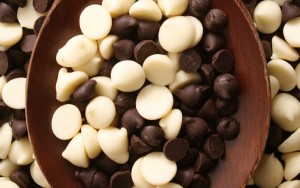HERZA announces organic chocolate pieces
 Worldwide sales of organic foods have increased by leaps and bound in the past few years, notes HERZA, pointing out that, whereas a good $15 billion were generated with organically grown products in 1999, the sum had risen to $72 billion by 2013. There is, says the company, no indication that this boom will come to an end: the demand for organic foods is still increasing.
Worldwide sales of organic foods have increased by leaps and bound in the past few years, notes HERZA, pointing out that, whereas a good $15 billion were generated with organically grown products in 1999, the sum had risen to $72 billion by 2013. There is, says the company, no indication that this boom will come to an end: the demand for organic foods is still increasing.
A new addition to HERZA’s range is organic chocolate pieces produced without sucrose: the sweet taste is achieved with coconut sugar, lucuma or rice syrup instead. These natural sweeteners have a comparatively low glycaemic index. To meet the continuing demand for high-protein products, HERZA also offers chocolate pieces enriched with valuable organic protein. Such organic protein chocolate is said to contain up to 30% more protein than standard milk chocolate. When organic protein is used, HERZA claims that the chocolate retains the delicate taste of milk chocolate and at the same time acquires an additional functional benefit. The high-protein organic chocolate pieces are also available with a reduced sugar content.
As with its conventional chocolate pieces, HERZA offers the organic qualities in a range of shapes. In the organic sector, there is also the popular three-colour mixture of white, dark and milk chocolate for decorating muffins, cakes and gateaux. A further new feature is a range of yoghurt compounds of organic quality; their special attribute is that they are made with cocoa butter instead of palm fat as a base. The small pieces of yoghurt compound permit individual flavours in muesli products.
As far as their sensory and physical properties are concerned, HERZA claims that its small organic chocolate pieces in no way differ from the conventional range. The possible applications are therefore equally diverse, according to Sales Director Carsten Braumann.
“The chocolate pieces in organic quality have excellent bake stability, too,” he said, “so they are ideal for use in cakes, biscuits or bakery mixes. Further classic applications are muesli, breakfast cereals and milk or yoghurt products.”


































